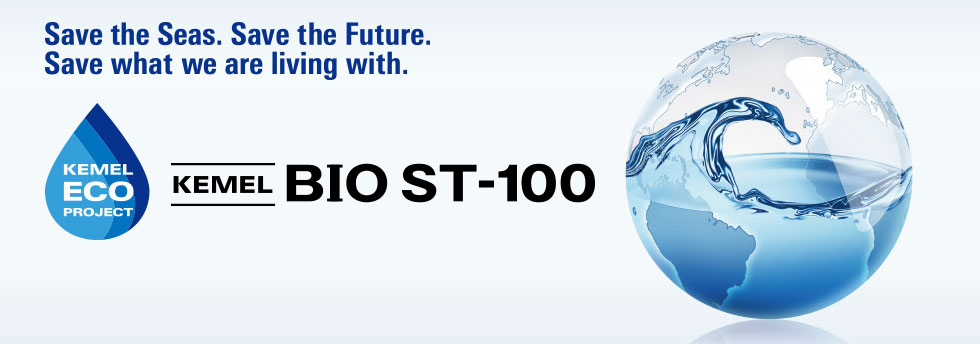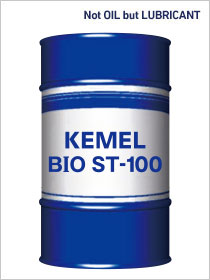
An Environmentally Acceptable Lubricant for use in stern tubes /
Friendly to the Seas
KEMEL BIO ST-100

From 2006, KEMEL began to supply own biodegradable lubricant “ST-77” and special seal designed for it. In 2014, the lubricant was changed to “ST-83A” to meet 2013 VGP of US EPA.
Now, KEMEL has developed the third generation lubricant “BIO ST-100” for the purpose of further improvement of bearing lubricating performance.
“ST-83A” will be switched to “BIO ST-100” in sequence from now on.
■Description
Base Fluid
Poly glycol, a type of poly glycol, is well known as non-toxic material.
It is generally applied in cosmetics and medicines.
No Sheen / No Sludge
BIO ST-100 is water soluble and forms no sheen or discoloration to the water. Also produces no sludge or emulsion under water surface.
High Seawater Tolerance
BIO ST-100 provides excellent lubrication and corrosion prevention even when the seawater content is 10%, because BIO ST-100 dose not occur hydrolysis like ester based EAL.
Bearing Lurication
BIO ST-100 is classified VG100 viscosity grade, and has higher dynamic viscosity than mineral oils and ester based EALs of VG100. BIO ST-100 gives thicker oil film than the other VG100 oils.
(Note)VG: Viscosity Grade
| KEMEL BIO ST-100 | Typical Mineral System Oil (VG100) | |
|---|---|---|
| Dynamic viscosity@40℃ | 122mPa・s | 93mPa・s |
2013 VGP of US EPA
BIO ST-100 meets the EAL (Environmentally Acceptable Lubricant) specification in 2013 VGP of US EPA.
- BiodegradableOECD 301B test method found BIO ST-100 readily biodegradable.
- Non-ToxicBIO ST-100 has been classified as harmless to aquatic lives under OECD 201, 202 and 203 tests.
- Non-Bioaccumulative BIOST-100 is not bioaccumulative to aquatic lives because it is water soluble.
Improvements of BIO ST-100 from ST-83A
- Higher Viscosity⇒Higher performance of oil film formation
- Lower Pour point⇒Better fluidity at low temperature
- Higher Flush point⇒Fire-retardant (flash point > 250 C)
Important Notice
- For stern tube seals, KEMEL special seals of advanced fluoric rubbers (FKM for PAG Bio/FEPM) should be applied.
- No chemical reaction occurs even if KEMEL BIO ST-100 is mixed with ST-83A. However, to conduct used lubricant analysis properly, please drain out ST-83A fully before filling the stern tube with Bio ST-100. No special flushing is necessary.
- LO In case of cleaning the inside of stern tube, pipes and tanks by flushing, BIO ST-100 (or ST-83A) or turbine oil should be used as flushing oil.
- Piping design should be consulted with KEMEL. KEMEL BIO ST-100 may absorb water from moisture in the air because KEMEL BIO ST-100 is water soluble.
- Epoxy paint should not be used for tank inside. Zinc-rich primer or non-coating is recommended.
Environmentally Acceptable Lubricant For Stern Tubes / Marine Hydraulic Systems KEMEL BIO ST-100
■Formula
Base fluid: Poly glycol
■Physical and Chemical Properties
| Appearance | Pale yellow liquid |
|---|---|
| Viscosity at 40℃ | 106mm2/s |
| Viscosity Index | 126 |
| Density at 15℃ | 1.15g/cm3 |
| Pour Point | -38℃ |
| Flash Point | 280℃(COC) |
| Solubility | Soluble in Water |
| Property | Test Method | Typical Result |
|---|---|---|
| Biodegradability | OECD 301B | > 60% |
| Toxicity | OECD 201 (alge) OECD 202 (daphnia) OECD 203 (fish) |
> 100mg/L |
| Bioaccumulation | OECD 107, 117 | Log Pow < 3 |
| Sheen or sludge formation |
Visual | No sheen / No sludge |
| Property | Test Method | Typical Result |
|---|---|---|
| Rust protection (steel) | ASTM D665 (Sea water) |
No rust |
| Corrosion protection (copper) | ASTM D130 | 1a |
| Foam suppression | ASTM D892 | 90/0 @24℃ |
| Oxidation stability | ASTM D2893 | Viscosity Change: 6% @40℃ |



